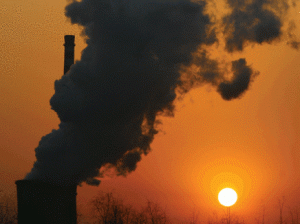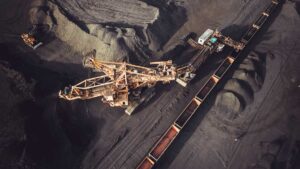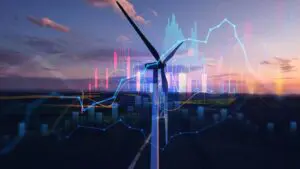PARIS: There is considerable concern in Paris – and elsewhere – about whether the deal negotiated at the UN climate change conference will be strong enough to drive the global decarbonisation effort that everyone recognises is needed.
Tony Seba, a leading academic from Stanford University, says it doesn’t matter.
He says the plunging costs of technology will sweep away political inertia and the resistance of vested interests. So much so that by 2030, he believes coal, oil and gas generation and usage will be all but obsolete.

Seba’s claims are not new. We reported on them last year, and more recently when he talked about God Parity and the decline of centralised generation, but 18 months after completing his book, Clean Disruption, Seba is now more convinced than ever that he is right.
“It’s happening,” he told RenewEconomy on the sidelines of the Paris climate talks.

“When you look at the industry from a technology cost curve and the adoption of the market of technologies such as solar and electric vehicles, and energy storage, and the astonishing progress in self driving cars, it’s actually happening more quickly than I predicted.”
Seba’s predictions are based around observations of what has occurred in other major technology breakthroughs – such as digital photos, the internet, mobile phones and then smart phones. Once costs fall below a certain point, the growth is both exponential and unstoppable.
“In technology, those kind of adoption curves are not unusual,” Seba says. “We went from film cameras to digital photos in a couple of years. What the resource-based industries don’t get is that technology adoption happens in an exponential manner. It never happens in linear fashion.
“So it may take a long time to get to a critical point. But once it does, it happens so quickly.”
Which is why Seba is not that concerned with the outcome in Paris, and the fact that it will likely fall short of the ultimate goal – a binding agreement to limit global warming to well below 2°C.
His views contrast with those of Elon Musk, the founder of electric vehicle and battery storage developer Tesla, who said this week that he wants a global carbon price, because without it the transition may take twice as long.
Both agree that the transition to renewable energy and battery storage could happen within 15 to 20 years, they just disagree on what would drive that transition. And Musk is a lot more conservative on the shift to clean transport.
One thing that Seba and Musk do agree on is the need to remove fossil fuel subsidies, which some would suggest includes the lack of a carbon price.
“If they achieve that, that is a huge goal,” Seba says. “Some of these targets will be pretty irrelevant. 2°C is not a target. Zero emissions is a target. We cannot control 2°C, but we can control zero carbon.”
Seba notes that many critics of renewable energy dismiss the technologies because they contribute so little on a global scale right now, just a few per cent of total electricity in the case of wind or solar.
“You’ll get mainstream media and politicians and even well-meaning folks complaining that it has taken solar so long to get to 1%. What they don’t see is that getting to 1% is the hard part.
“Solar has been doubling installed capacity for years. But it started from a small base, so you ask yourself how many more doublings do you need to get to 100 per cent?
“In the case of solar, all we need is 7 more doublings – and that could happen in 13 or 14 years.
Clearly, though, many vested interests see this as a threat, which is why they are, with the help of regulators, pushing back on policies – removing carbon prices, cutting renewable energy targets, reducing feed-in tariffs, raising fixed charges, and other means designed to slow the uptake.
“It is called regulatory capture, and the fossil fuel industry has perfected it,” Seba says. “Because of this regulatory capture, governments and regulatory bodies will push back, but they can’t stop it.”
That’s because the regulators and the vested interests will lose control. For more than a century, energy generation has been centralised and all the decisions were made by big banks and regulatory agencies. Consumers had no input.
That is now changing. The uptake of solar PV is consumer driven, and it will be the same with electric vehicles and battery storage.
“When something is consumer driven and distributed, it is different. The conventional industry either doesn’t understand that, or doesn’t want to understand that,” Seba says.
But some people are listening. Seba is now in hot demand from large super funds – including some in Australia – who are seeking his advice about the changes that will take place.
This, says Seba, is underlying some of the major divestment decisions. “Getting out of fossils is not a moral decision, it is a smart decision. Any money you put into a new plant you will lose, because it is not going to last 40 years.”
Seba says that the unsubsidised cost of solar PV on the rooftops of Ikea, WalMart and malls and factories is going to fall below the cost of transmission very quickly, in every single market in the world.
“That means that you can generate coal, gas or nuclear, and invest in fusion. If you can do that for zero, you will still not compete with rooftop solar.”
Still, Seba says that a grid will survive, even if the economics of solar and storage will make it very cheap for those who want to leave the grid to do so.
“I don’t think most people will. There is resilience in the network. For instance, 80 per cent of us live in cities. But that means that networks also need to be valued appropriately, because as the technology costs fall, consumers will make an economic choice, and the existing business model will be obsolete.
“You cannot compete with zero marginal cost technologies. That is what killed Kodak.”
So, why doesn’t this register with mainstream media, and why is there such demonisation of wind and solar technologies? At RenewEconomy, we can’t remember mainstream media defending fixed landlines and film cameras with quite the same vigour.
Seba points to the fossil fuel industry revenues of some $8 trillion a year. “That buys you a lot of advertising, and a lot of PR. In the US, it can buy elections. But it is just noise and propaganda. That is not unlike what the tobacco industry did.”
Fossil fuel interests boosted by Macfarlane shift
Fossil fuel interests will no doubt be heartened by the reported defection of former industry minister Ian Macfarlane from the Liberal Party to the LNP, which could lead to him becoming the party’s leader, and therefore deputy prime minister.
As energy minister in the Howard and Abbott governments, and energy and industry spokesman under Malcolm Turnbull, Macfarlane has played critical roles for the fossil fuel industry.
He ensured there was ample compensation written in to the CPRS he negotiated with Penny Wong, and in both the Howard and Abbott governments he effectively brought a successful and well functioning renewable energy target policy mechanism to a grinding halt. More recently, he is said to have had a critical role in persuading Turnbull not to sign the deal to remove fossil fuel subsidies at the Paris climate talks.
As Labor’s energy spokesman, Gary Gray once said: He, Macfarlane and former energy minister Martin Ferguson were likes peas in a bod. Ferguson is now lobbying for the oil and gas industry, Gray is an enthusiastic supporter of the Carmichael coal project, and many other coal mines, Macfarlane looks like he is about to be deputy prime minister.
Climate sceptics get ready to take centre stage
Climate sceptics are taking a relatively low profile at these talks, choosing to lob in criticism from a distance. But next week will be their time in the spotlight, or at least on a red carpet.
Marc Morano, the founder of Climate Depot, is hosting an “invitation only red carpet event” in Paris, showing his film Climate Hustle, the counterpunch to Al Gore’s An Inconvenient Truth which supposedly provides interviews with “30 renowned scientists” that lays out “compelling evidence that devastates the global warming scare.”
The film is produced by the Committee for a Constructive Tomorrow, which has gotten cash from fossil fuel interests including ExxonMobil and Chevron. Morano promises on his website that the film is “set to rock” the climate talks. As for invitation only – it turns out that all media has been invited. At least there will be champagne.
Progress in the talks, by the numbers
As for the COP21 talks, an updated draft text of the proposed Paris Agreement was released, revealing there was still a lot of work to resolve differences, which are flagged as “bracketed text”.
The bad news? The number of disputed brackets have increased in number from 1,617 to 1,718. Even at this late stage, rather than reduce disagreements, negotiators are raising new specific issues of contention. This would seemingly suggest that negotiations are moving backwards.
In the not too distant past, Denmark was an inspiration for many clean energy and climate change advocates, setting ambitious targets and rolling out wind energy.
But since the election of a minority, right-wing government, things have changed. The Danish Environment Minister, Lars Christian Lilleholt, said in Paris he is in favour of scrapping his country’s ambitious national carbon reduction target of 40 per cent by 2020, and he has also slashed the climate finance budget in half.
And that’s what earned them the Fossil of the Day award at the Paris climate talks on Friday.







